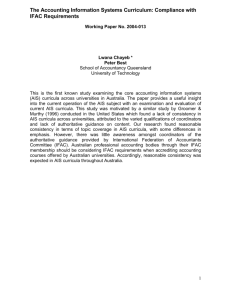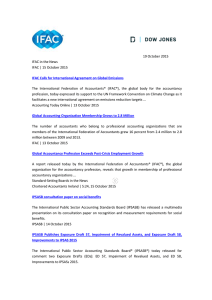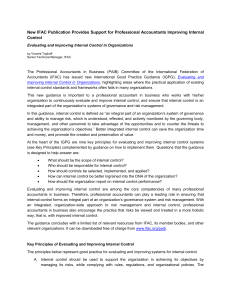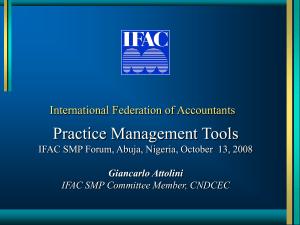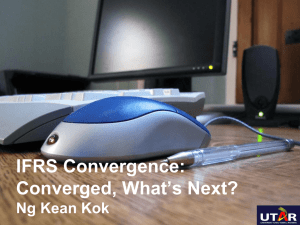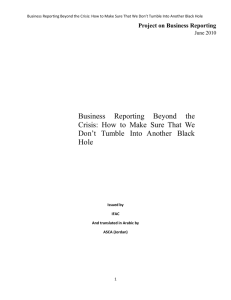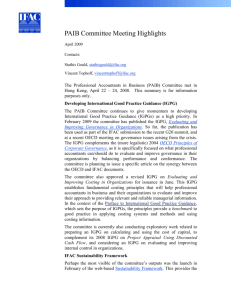BUILDING AN INVESTMENT CLIMATE OF TRUST President, International Federation of Accountants
advertisement
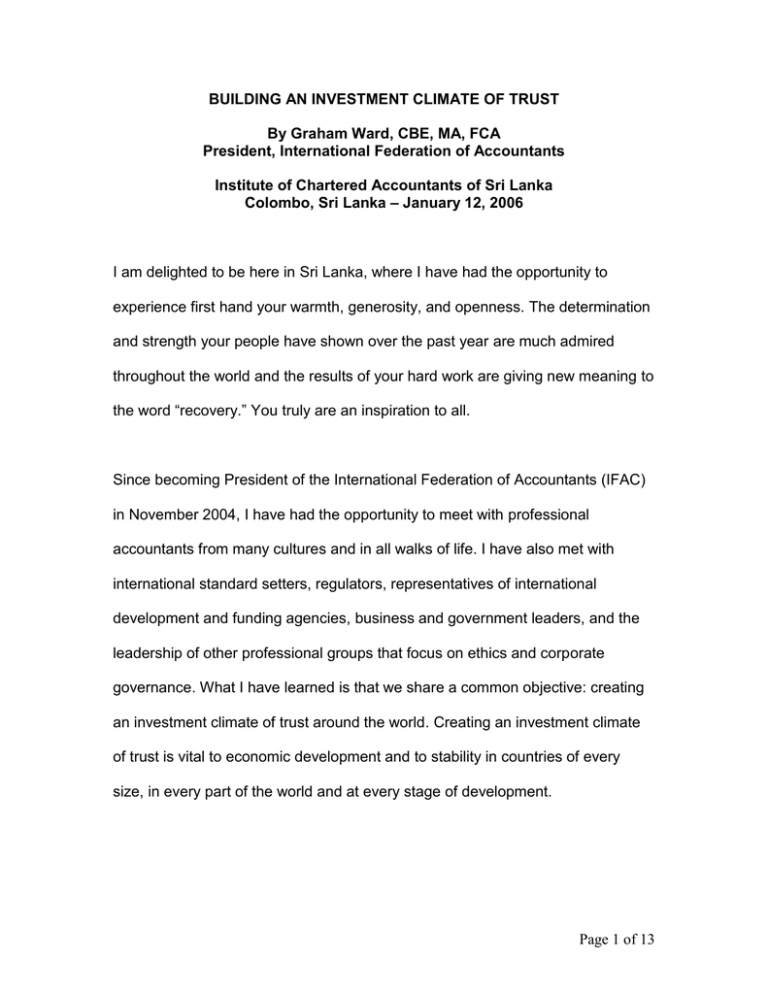
BUILDING AN INVESTMENT CLIMATE OF TRUST By Graham Ward, CBE, MA, FCA President, International Federation of Accountants Institute of Chartered Accountants of Sri Lanka Colombo, Sri Lanka – January 12, 2006 I am delighted to be here in Sri Lanka, where I have had the opportunity to experience first hand your warmth, generosity, and openness. The determination and strength your people have shown over the past year are much admired throughout the world and the results of your hard work are giving new meaning to the word “recovery.” You truly are an inspiration to all. Since becoming President of the International Federation of Accountants (IFAC) in November 2004, I have had the opportunity to meet with professional accountants from many cultures and in all walks of life. I have also met with international standard setters, regulators, representatives of international development and funding agencies, business and government leaders, and the leadership of other professional groups that focus on ethics and corporate governance. What I have learned is that we share a common objective: creating an investment climate of trust around the world. Creating an investment climate of trust is vital to economic development and to stability in countries of every size, in every part of the world and at every stage of development. Page 1 of 13 This is not a new challenge to Sri Lanka, which has been and continues to be poised to benefit from global commerce. A look at your history, particularly that of Galle, is a reminder of Sri Lanka’s involvement, from its earliest days, in globalization. The Chinese explorer Zheng arrived in this post city in the early 1400s. Then, in 1505, a Portuguese fleet arrived, setting the stage for a bigger commercial boom. And in 1663, the Dutch built Galle Fort, the city’s main tourist attraction. Today, despite the setbacks of the tsunami, Sri Lanka is, I believe poised once again to increase its commercial and trade activities, to boost its economy, and to improve the quality of life of its citizens. Doing so requires a global perspective, a commitment by those in government and business to increased accountability and a willingness to demonstrate greater transparency in all transactions – both public and private. My comments today are limited to how CFOs and the accountancy profession in general can contribute to building an investment climate of trust. It is important, however, to acknowledge that building sustainable economic growth – growth that can effectively close the gap between the “haves” and “have nots”, growth that is based on increased employment and growth that leads to higher standards of living for all your citizens -- requires actions by many other individuals, professions and entities here in Sri Lanka. Let me begin by commenting on why IFAC is involved and indeed, cares about your situation, here in Sri Lanka. IFAC’s mission is global in thrust and publicinterest oriented. I’d like to state it for you now: Page 2 of 13 “To serve the public interest, IFAC will continue to strengthen the worldwide accountancy profession and contribute to the development of strong international economies by establishing and promoting adherence to high-quality professional standards, furthering the international convergence of such standards and speaking out on public interest issues where the profession's expertise is most relevant.” IFAC works with its member bodies, such as the Institute here in Sri Lanka, to achieve this mission. To serve the public interest effectively and to contribute to the development of strong economies, also involves much more than the work of IFAC. It involves actions by governments, regulators, standard setters, and most especially, by business leaders such as yourselves. And it begins by creating an investment climate of trust, which is my topic of discussion today. Chief financial officers and other business leaders play a key role in building this climate of trust. As the gatekeepers of financial information and the financial and strategic decision makers, you are in a key role to develop the business strategies that promote not only growth and profit, but also confidence. How can we create an investment climate of trust that will lead to economic growth and stability not just here in Sri Lanka but worldwide? In a report released last year by the World Economic Forum’s Global Corporate Citizenship Initiative (GCCI), based on surveys of CEOs worldwide, the majority of CEOs agreed that Page 3 of 13 the most important contribution business leaders can make to development is in the way they run their own businesses. They must set the example for quality and lay the groundwork for achieving profitability that can then benefit others. So how can you set the example for others? The answers were outlined in the IFAC report, Rebuilding Public Confidence in Financial Reporting: an International Perspective, also known as the “Credibility Report.” After extensive discussion and debate with leaders of businesses, accountancy firms, governments and regulatory bodies, in August 2003, the IFAC Task Force on Rebuilding Public Confidence in Financial Reporting, chaired by John Crow, a former Governor of the Bank of Canada and a former Chairman of the Central Bank Governors of the Group of Ten countries, of which I was a member, issued its final report. It included recommendations on principles of best practices in the areas of financial reporting, corporate governance, corporate disclosure and auditor performance. I will highlight a few of these best practice areas now, because I believe that they are central to building an investment climate of trust and are relevant to all of us today. Before I do so, however, I would like to emphasize the major finding – and that is, that building investor confidence requires action by all those in the financial reporting supply chain, from boards of directors to management to auditors, even to bankers, lawyers and investment analysts. Thus, while all of us here are accountable for building an investment climate of trust, we are not alone. Page 4 of 13 Let me turn now to four recommendations in the report that are directly relevant today: those relating to ethics; financial management and control; auditor independence and corporate governance; and audit standards and regulation. The first recommendation relates to values. Effective corporate ethics codes need to be in place and actively monitored. The task force recommended that companies set out their ethical policies in a code that is widely distributed both within the company and to shareholders. We also recommended that training be given and that support be provided for individuals better to enable them to face difficult ethical questions. More and more companies, out of a real desire to do the right thing, as well as a result of regulatory pressures, are developing ethical codes. To be effective, this must be taken one step further: board-monitoring procedures should be put in place so that adherence to the ethical values of a company can be measured. IFAC’s Professional Accountants in Business Committee is also in the process of developing new guidance on corporate codes of conduct. Scheduled to be released in an exposure draft format this month, the new proposed guidance is designed to draw greater attention to the need for corporate codes of conduct, to provide practical guidance on the scope and implementation of such codes, and to support sound corporate governance practices. The proposed guidance highlights the benefits of an effective code of conduct and identifies the professional accountant’s role in the development, monitoring, reinforcement and reporting of such codes in their organizations Page 5 of 13 In addition, IFAC’s Code of Ethics, which applies to all accountants, including those working in business, is being revised to provide more specific guidance for professional accountants in business, particularly in instances where they encounter fraud. A second key recommendation in the Credibility Report is that corporate management should place greater emphasis on the effectiveness of financial management and controls. Certainly, regulatory changes in the light of Enron and other business failures have also focused on this need. To build investor confidence, there should be formal reporting to shareholders setting out the responsibility for financial reporting and for internal controls, as well as regular assessment by the audit committee of the appropriateness of the resources being devoted to the adequacy and effectiveness of internal control. Knowledge of reporting and controls, I believe, should be considered a core competence of the Chief Financial Officer (CFO). As many of you can attest, your roles and responsibilities have greatly expanded to include everything from strategic planning, to information technology, to financing, and investor relations. Despite these changes in the CFO’s role – all of which I do believe are crucial -it is vital that financial controls and reporting issues remain a priority. Another key recommendation in the Credibility Report is that threats to auditor independence should receive greater attention in corporate governance Page 6 of 13 processes and by auditors themselves. Sound corporate governance practices have become critical to worldwide efforts to stabilize and strengthen global capital markets and protect investors. As the Credibility Report pointed out, all public interest entities should have an audit committee, or similar governance body or bodies, formed from directors independent of management with clearly defined responsibilities, including monitoring and reviewing the integrity of financial reporting, financial controls, the internal audit function and relations with the independent auditors. Audit committees play a critical role in the systems of checks and balances designed to protect investor rights. The Credibility Report also recommended that the IFAC Code of Ethics for Professional Accountants should be the basis for national codes of independence. The ICASL models its code on the IFAC code and includes additional requirements to address specific national issues and laws. The IFAC Code emphasizes that auditors need to be constantly vigilant to identify threats to independence and that any such threats should be appropriately addressed through safeguards. For example, it is important for auditors to communicate regularly with the audit committee on matters with respect to independence, in particular the provision of non-audit services. With respect to rotation of auditors, there is no evidence that supports the need for firm rotation as a means of improving audit quality; indeed, the evidence is to the contrary. IFAC’s Code addresses the familiarity threats, while retaining the Page 7 of 13 emphasis on audit quality, by requiring the rotation of the audit partner on listed entities. Let me now move on to another of the key recommendations in the Credibility Report that relates to building investor confidence: That is the recommendation that audit standards, and all IFAC standards, as well as regulation, be strengthened. IFAC has invested and is continuing to invest a significant amount of effort in these areas. We well recognize that in order for practitioners to deliver quality, they need high quality, internationally accepted standards. Thus, at IFAC, increased effort has been placed on enhancing our standard-setting processes, on improving the transparency of those processes and on devoting more resources to them. Over the past year, the International Auditing and Assurance Standards Board, Ethics Standards Board for Accountants, International Accounting Education Board and International Public Sector Accounting Standards Board have sought to increase public interest input into their standardsetting processes. Each of these boards has public members as well as a consultative advisory group, comprised of relevant stakeholders, who can provide meaningful input on the work programs of each group from a public interest perspective. Time does not permit me to enumerate all the projects and standards that are under development by these groups – but I can assure you that they each are addressing areas where the public interest is most significant. For example, the Page 8 of 13 IAASB is addressing the clarity of its standards and the Education Committee has released an exposure draft on the training of audit professionals. I want to emphasize that outreach to regulators, standard setters, and others is also an important part of IFAC’s standard-setting efforts and particularly of the IAASB’s. The IAASB regularly holds meetings with international standard setters, briefing them on IAASB priorities and obtaining their input. Through IFAC’s Regulatory Liaison Group, speaking engagements, and one-on-one meetings, we have also kept regulators apprised of IFAC standard-setting initiatives and listened to and responded to their views on our activities. As an international standard setter with global convergence as an objective, IFAC has a responsibility to consider and accommodate the needs of developing economies, small and medium enterprises and private sector not-for-profit organizations. It is a responsibility that we take very seriously indeed. Two key committees – the Small and Medium Practices (SMP) Committee and the Developing Nations Permanent Task Force – are ensuring that international standard setters are made aware of issues both from a small and medium enterprise perspective and from an emerging economy perspective. Our Developing Nations Committee is also increasingly involved in outreach to developing nations and recently produced guidance to help these countries establish and maintain an effective accountancy profession, which we view as a necessary step in building a sound financial architecture in any country. Page 9 of 13 The formation in February of last year of the new international Public Interest Oversight Board, which is comprised of very senior and independent people and chaired by Professor Stavros Thomadakis, further enhances the credibility of IFAC standards and will, we believe, contribute to building an investment climate of trust. The new Board, created as part of a series of IFAC reforms, oversees the work of IFAC’s Public Interest Activity Committees – the IAASB, our Ethics Board, and our Education Board – as well as of our Member Body Compliance Program. The PIOB, as representatives of the public, will provide the independent verification that IFAC is fulfilling its public interest mandate. The PIOB’s responsibilities include the following: It will evaluate the due process of IFAC standard-setting activities and report publicly. It will approve the process for nominating members to the Public Interest Activity Committees, and approve the appointment of the chairs and other members of these committees. It has the right to recommend that a specific matter be added to the work program or agenda of a Public Interest Activity Committee. It has the right to be an observer, with the privilege of the floor, at IFAC Board and other meetings where matters pertaining to the Public Interest Activity Committees are being discussed. IFAC’s Boards are fully supportive of the PIOB and its members. The PIOB recently approved a due process for all the Boards as well as the nominations of Page 10 of 13 their new members. The PIOB’s active involvement will, we hope, further demonstrate our commitment to quality and accountability and lead to increased confidence in the profession on a global scale. There has never been a global body overseeing the work of the accountancy profession. The creation of the PIOB is a significant “first” and a critical one in ensuring that confidence in the profession and trust in capital markets does not erode. I want to emphasize that these regulatory initiatives are not meant to duplicate those of national bodies, but rather to reinforce and complement them. We have seen legislation, such as the Sarbanes Oxley legislation in the United States, developed as part of the response to business failures. IFAC’s Regulatory Liaison Group continually monitors the development of such legislation and we liaise with regulators, such as the Public Company Accounting Oversight Board (PCAOB) on matters of standard setting and regulation, recognizing that we are all dedicated to improving the quality of financial information and to strengthening corporate governance. We all need to keep in mind, that while the SOX legislation was developed with the public interest in mind, there are aspects of the legislation that were never anticipated – such as the high costs of implementation, which far exceeded the estimate made when the legislation was under consideration. This issue is being addressed by the PCAOB, but there is no short-term solution for businesses affected by the legislation. Page 11 of 13 As we look to the future, we are likely to see more regulatory changes, changes that I hope will lead to further building an investment climate of trust without placing an unnecessary and disproportionate burden on businesses. While many of us here have little control over what those changes may be, I am confident that if we continue to act with integrity and adhere to high ethical standards, our burdens will be less, the credibility of financial information released by companies worldwide will be greater, markets will be more efficient, the cost of capital will be lower and economies will be more prosperous. Clearly, the role you play as CFO will become increasingly more critical and complex in the changing national environment and expanding global one. To help CFOs to meet these challenges, our Professional Accountants in Business Committee is developing new good practice guidance and information papers on a number of topics, such as governance, business planning and internal control. For example, the Committee is developing a conceptual framework in respect of governance that will consider both the conformance and performance aspects of governance as it affects the corporate, public and SME sectors. These documents will supplement other PAIB publications, such as the recently released study “The Roles and Domain of the Professional Accountant in Business” which seek to shed light on the changing role of the PAIB. Clearly, accountants in business and CFOs are in the front line in ensuring the fiscal and ethical soundness and accountability of commercial enterprise. I Page 12 of 13 applaud you all for all that you do in carrying out this responsibility and assure you that IFAC will continue to offer its ongoing support. Please continue to advocate and act with transparency, integrity and expertise. Together, we can build a better world, contributing to greater economic growth and stability. Together we can build an investment climate of trust. And together we can build a better quality of life for the people of Sri Lanka and for the people in countries like yours around the globe. Thank you very much indeed for your attention. Page 13 of 13
